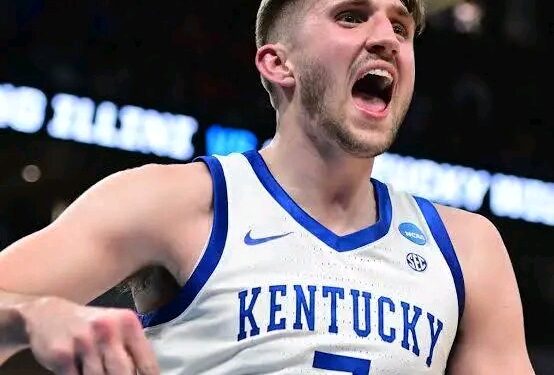What was supposed to be a heartfelt act of kindness by Kentucky basketball star Andrew Carr has unexpectedly turned into a heated debate across social media and sports talk shows.
Over the weekend, Carr made a surprise visit to the Lexington Veterans Center, where he spent several hours cooking and serving meals to disabled veterans. The gesture brought many to tears — including veterans and staff members — and initially drew widespread praise as a powerful act of humility and gratitude.
“This is what real leadership looks like,” said one staff member at the center. “He didn’t come for applause. He came to serve.”
But not everyone is convinced.
In the hours after video clips and photos went viral, a wave of skeptical reactions began circulating online. Critics questioned the timing, intent, and public exposure of Carr’s visit — pointing to his rising draft stock and recent NIL partnerships as possible motivations behind the move.
Some of the harsher comments accused Carr of using disabled veterans for “image management” during a crucial off-season, especially with NBA scouts reportedly watching his off-court activities as closely as his performance in workouts.
A post on Reddit’s college basketball thread bluntly asked:
“Was this a heartfelt gesture—or a calculated PR move before the draft?”
Another user on X (formerly Twitter) wrote:
“Not saying it wasn’t kind. But cameras were there. Photos were ready. It’s not a coincidence.”
Supporters, however, are pushing back hard, defending Carr’s character and pointing out that no press release was sent, and no university personnel appeared involved.
Teammate and close friend Reed Sheppard came to Carr’s defense, tweeting:
“Y’all really questioning Andrew’s heart? He’s been doing stuff like this since high school. Just because it’s public now doesn’t mean it’s fake.”
The debate has sparked a larger conversation about the fine line between sincerity and publicity in today’s NIL-driven, brand-conscious NCAA landscape. Are acts of kindness ever just pure anymore—or are they always part of a broader play?
One thing’s for sure: whether motivated by heart, optics, or both, Andrew Carr’s gesture got the attention of the public—and forced people to ask uncomfortable questions about how we view athletes, charity, and authenticity in the age of influence.














